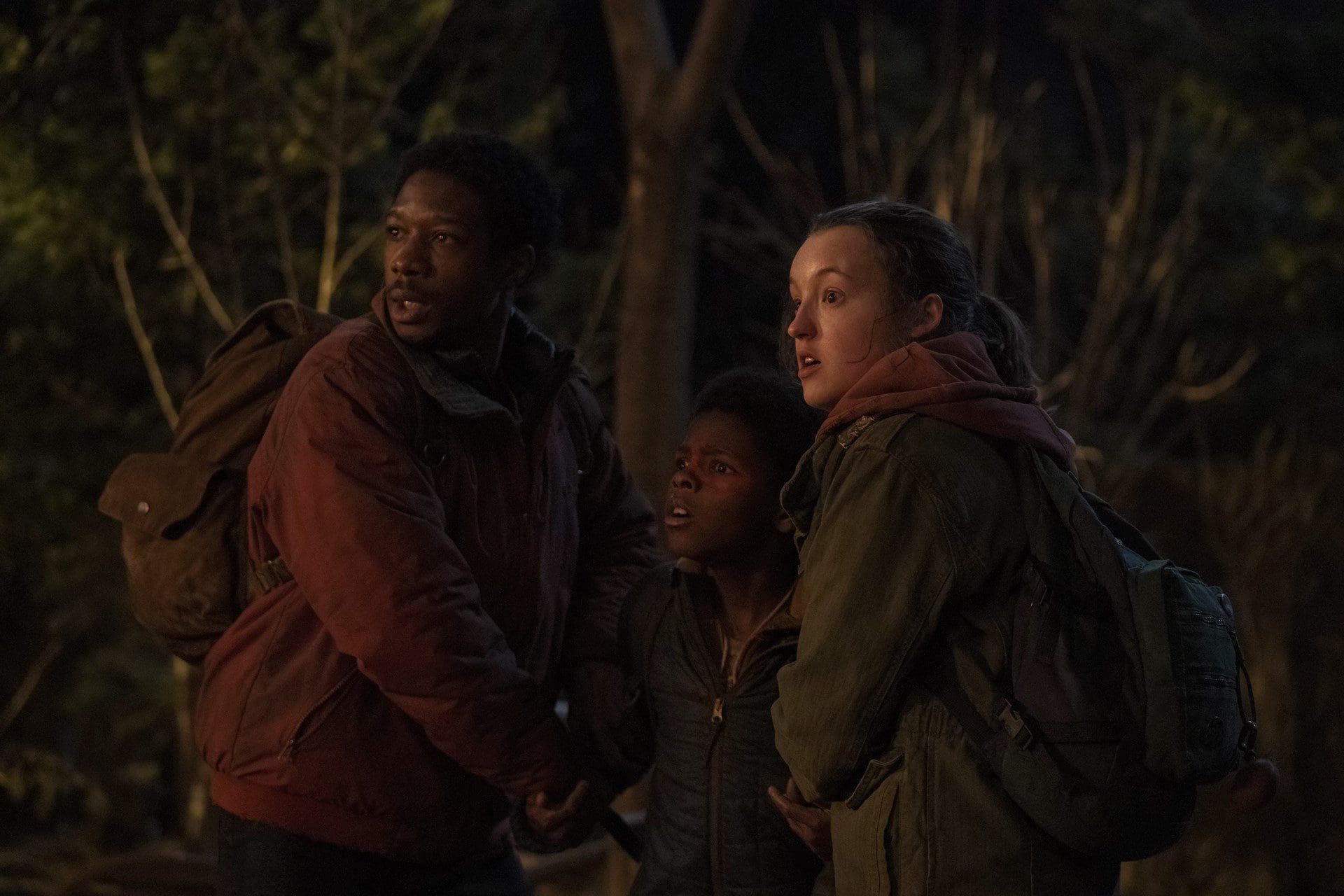
Stream the final season of Star Trek: Picard now exclusively on Paramount+.
Try 1-month FREE with promo code: PICARD, offer ends 4/30!
In The Last Of Us video game, the Pittsburgh segment (the game’s equivalent of the show’s Kansas City) has our heroes being hunted by a group called just that: hunters. These hunters are explicitly, unquestionably evil, mowing down innocent crowds of people with machine guns just to see if they have any items they deem worthwhile. Seeing a more sympathetic side in Episode 4 had me on edge. Was this sympathetic side the real deal or a fake out?
It’s both.
The Last of Us Episode 5, ‘Endure and Survive,” we find that Henry (Lamar Johnson, The Hate U Give) and Sam (Kevionn Woodard) are still on the run from Kathleen (Melanie Lynskey, Yellowjackets), the latter blaming Henry for the death of her brother, Michael. We learn more about Michael. We learn he was a great man, the kind of man you could follow anywhere, the kind of man who led the resistance against the murderous dictators known as FEDRA. We learn this from Henry, the man who ratted him out. Henry embraces his desperation to get Sam life-saving medication and his place in the death of a great man with equal measure.
When he asks Joel if what he did makes him a bad guy, you might think it’s a rhetorical question. Henry himself refutes that notion, calling out Joel’s momentary silence and saying “I am the bad guy because I did a bad guy thing.” Henry is, arguably, responsible for the hell that breaks loose under Kathleen’s rule. Kathleen explicitly dismisses Michael’s request that she forgive Henry, and her right hand man Perry (Jeffrey Pierce, who played Joel’s brother Tommy in the game series) stands behind her, calling Michael a great man, like Henry claimed, but claims Michael changed nothing, which Henry did not. And so, the chase goes on.
As Joel and Ellie escape with Henry and Sam, a confrontation with a sniper stops them in their tracks. The sequence, following Joel evading gunfire through the decrepit suburbs, is taken from the game, and utilizes similarly compelling formal distinctions we’ve seen before, with Joel’s body being barely distinguishable from his surroundings, to capture the difficulty of the sniper’s job. The key textual change is in the sniper himself. In the game, he was another gleefully malicious hunter, and when Joel comes face to face with him, the unnamed hunter fights back immediately, but not Bryan. This old man with the sniper doesn’t fight back immediately. It could be argued he doesn’t fight back at all. Bearing the upper hand, Joel begs Bryan to just put the gun down, push it his way, and leave. After a few moments, a resigned Bryan turns his gun on Joel. It’s the last thing he’ll ever do.
Eventually in the episode, chaos ensues. Infected and hunters are everywhere, and our heroes must evade both. It’s a pretty magnificent set piece, unleashing a number of infected people playing the game that couldn’t possibly encounter within gunplay. The unleashed infected leads to a heartbreaking scene. (Truthfully, heartbreaking doesn’t begin to describe it.) There is a key moment in the game that leads to this heartbreaking scene. Because this key moment occurs during gameplay, you feel you have control over it, and, upon replays, with this control is an attempt to undo it. I’ve played the game six or seven times now. With each replay, I vainly pause and replay the checkpoint, maybe six or seven times a playthrough. When I replayed the PS5 edition, I specifically turned on super-slow-mo, in the hopes that stretching out time could help things. It doesn’t matter how in vain it is, I would feel like a failure if I didn’t at least try.
The viewer of the show will have no chance to try in vain. Restarting a checkpoint in an interactive medium is one thing, rewinding a frame in a solely viewable one is another. This means the naively beautiful and achingly futile attempt rests on someone exclusively within the frame, and that someone is Ellie. The player’s futile attempt involves a sniper rifle, but Ellie’s futile attempt involves herself as she currently is. Her flesh, her blood, the will of her very soul. It’s the first time she’s confronted the purpose of her immunity, and what she can do with it.
In this case, all she could do was try. I would say that Ellie’s effort to fight for someone of the world is, itself, evidence that the world is worth fighting for. But if I’m reading the episode’s last moments correctly, I fear she hasn’t yet reached the same conclusion.


Comments are closed.